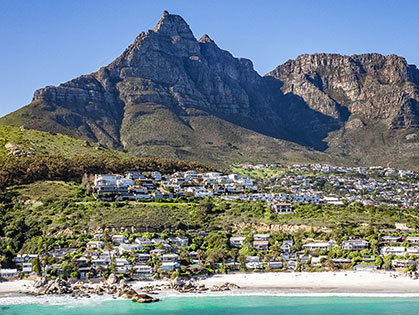
General Information
Cyprus and South Africa relations were established in 1993, and have been growing steadily since, especially in the business and trading sector.
The Republic of South Africa is located at the southern point of Africa, connecting the South Atlantic and Indian oceans. South Africa is the 25th-largest country in the world by land and population, with wide variety of cultures, languages, and religions.
South African economy is newly industrialized and ranked on the upper-middle income level by the World Bank. The Republic has the second largest economy in Africa with significant regional influence in its diversity of sectors and industries. South Africa has got modern and extensive transport infrastructure with competitive labour costs, and significant natural resources. These economic benefits have made the country a popular investment destination, where Cyprus signed the Double Tax treaty in 1997. Since Cyprus has become a part of the European Union, this partnership has leveraged even more.
|
|
South Africa |
Cyprus |
|
Area |
1,22 million sq. km. |
9.250km² |
|
Population |
51,7 million |
850 thousand |
|
Capital |
Pretoria - (Executive Capital) Cape Town - (Legislative Capital) Bloemfontein - (Judicial Capital) |
Nicosia |
|
Currency |
Rand (ZAR)=100 cents |
Euro |
|
Time zone |
GMT +2 |
GMT +2 |
|
Official language |
11 Official languages including English, Africaans, Sesotho, Setswana, Xhosa and Zulu |
Greek/Turkish |
|
Business language |
English |
English |
|
Major Religion |
Christianity, Islam, Indigenous belief |
Christian Orthodox |
|
Type of government |
Parliamentary |
Presidential |
|
Main exports |
Gold, diamonds, metals and minerals, can and machinery |
Tourism, Oil and gas |
Accounting and regulatory framework
All accounting books and financial statements in South Africa must be prepared in English language and ZAR currency (South African rand). South Africa follows South African accounting standards and principles, which are converging with IFRS and GAAP. Companies which meet certain size criteria must prepare individual financial statements under IFRS. Consolidated financial statements must be prepared in accordance to IFRS as adopted by the South African Institute of Chartered Accountants. Filing of financial statements should be made to the Commercial Register within 7 months from the year-end.
In Cyprus accounting books and financial statements follow IFRS as adopted by the EU and the Companies Act in Cyprus. Filing of financial statements should be made to the Registrar of Companies and tax authorities within 12 months from year-end.
Overview of tax system
Legal entities that are seated in South Africa or whose place of effective management is located in South Africa are generally regarded as tax residents of the Republic and are liable to South Africa’s tax legislation.
Legal entities are regarded as Cyprus residents if management and control is exercised in Cyprus and are liable to Cyprus taxation.
Tax system of South Africa may include payments to the different levels of government including central (SARS) and local government. Central government payments consist of the following, to name a few, income tax, VAT, corporation tax and fuel duty. Local government payments are generated from fund grants and municipal rates.
Cyprus tax system comprises of Income taxes (personal and corporate) include, to name a few, Value Added Tax Excise duties, Stamp duty, Special Defence contribution (only for residents), Capital Gains Tax.
Beneficial tax system
Cyrpus
- 12,5% corporate tax on profits
- No withholding taxes on outgoing payments of interest, royalties and dividends for non-residents
- No thin capitalization rules apply
- Capital gains on sale of securities are exempt in Cyprus
- Interest expense on 100% corporate acquisitions is tax deductible
- Fully reformed IP regime
- Capital gains from sale of immovable properties outside Cyprus is exempt
South Africa
- 14% VAT
- No capital tax
- Flat corporate income tax rate at 28%
- 0-8% real estate transfer tax
- 15% divident tax, subject to exemption for non-residents in terms of a double taxation treaty
South Africa Regional analysis
The Republic of South Africa, situated on the southern point of Africa, has got 2,798 klm of coastline populated with 51 ml people in the nine provinces. The country’s provinces are divided into 52 districts and 226 local municipalities. Johannesburg, the largest and the wealthiest city of the country, has the largest economy than any metropolitan region in Sub-Saharan Africa.
South Africa has got a wide range of natural resources, including coal, platinum, coal, gold, iron, nickel, uranium and chromium. The country attracts special interest from international corporations especially due to its wealth in oil and gas sector.
The Republic is known for its mixed economy and a relatively high GDP per capital compared to other countries in the region at US$11,750. However, the country still encounters a relatively high rate of poverty and unemployment, and is ranked in the top 10 world countries for income inequality.
South Africa was a founding member of the United Nations, and after 1994 managed to significantly bring down the inflation index and stabilize public finances. The country has seen booming economic growth from 2004 onwards together with employment and capital formation.
In 2013, the Republic was ranked as the top Country of the African continent for its economic potential, labor environment, cost-effectiveness, infrastructure, and foreign direct investment Strategy.

